Dental Implants Problems & Complications
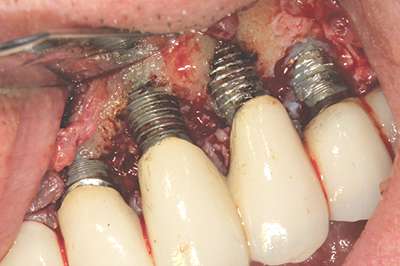
Dental Implant Complications
Complications can follow implant surgery as any other surgical procedure and in some cases they can cause implant failure. The key factors in minimizing the risk complications are the selection of an experienced dentist, careful pre-operative treatment planning and proper after-care and oral hygiene.
Implant failures are usually caused by a combination of problems. A surgery error can lead to infection, this can lead to osseointegration failure and finally to loss of implant.
In this Article:
#1 Damage to adjacent tissues
Surgical errors during the implant placement operation can cause serious complications. This type of problems are rare when the operation is executed by an experienced and skilled implant dentist.
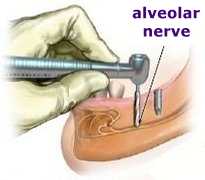 Nerve Damage - Nerve damage is a rare complication of implant surgery in the lower jaw
when the inferior alveolar nerve which runs through the lower jay is injured during drilling.
Nerve injury may cause pain, numbness or tingling in teeth, gums, lips, tongue or chin.
Similar symptoms may occur if the implant is placed right on top of the nerve, causing severe pain when chewing.
If the nerve fails to heal and the symptoms insist, the implant might have to be removed. X-rays and computed tomography (CT) scans can help the dentist
to identify the exact location of the nerve and minimize the possibility of complications.
Nerve Damage - Nerve damage is a rare complication of implant surgery in the lower jaw
when the inferior alveolar nerve which runs through the lower jay is injured during drilling.
Nerve injury may cause pain, numbness or tingling in teeth, gums, lips, tongue or chin.
Similar symptoms may occur if the implant is placed right on top of the nerve, causing severe pain when chewing.
If the nerve fails to heal and the symptoms insist, the implant might have to be removed. X-rays and computed tomography (CT) scans can help the dentist
to identify the exact location of the nerve and minimize the possibility of complications.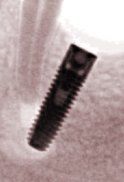 Teeth Damage - When drilling, the dentist may damage the root of an adjacent tooth.
A root canal or apicoectomy may be needed to repair the injured tooth root.
Teeth Damage - When drilling, the dentist may damage the root of an adjacent tooth.
A root canal or apicoectomy may be needed to repair the injured tooth root.- Sinus Perforation - A possible complication in upper jaw surgeries is drilling through the jawbone into the sinus cavity which can lead to infection. If the depth of the jaw bone is not enough, a 'sinus augmentation' is needed to provide sufficient bone for successful implant placement.
- Jaw Fracture - A very rare complication during implants placement is jaw fracture. If there is not enough bone or bone density, the jaw may fracture under the pressure sustained during the surgical procedure (during drilling or implant insertion).
Although there is always a possibility of a surgical error or other complication, proper selection of implant dentist is a main factor for a successful treatment. An experienced dentist is able to identify potential problems by examining x-rays or CT-scan, design the proper surgery plan and execute it successfully without problems.
#2 Osseointegration Failure
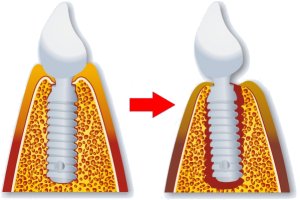 The most important factor for the success of the treatment is the proper bonding of the implant to the jawbone (sseointegration).
The following conditions can disturb the normal osseointegration process:
The most important factor for the success of the treatment is the proper bonding of the implant to the jawbone (sseointegration).
The following conditions can disturb the normal osseointegration process:
- Lack of healthy bone - If the dentist decides to place an implant in a position where there is not enough bone to provide adequate stability, it may move around within the bone and bonding will not occur. Combined with overloading issues, the lack of healthy bone may even cause jaw fracture.
- Smoking - Several research studies have shown that implant failure rates are double or more in smokers than in non-smokers. Increased failure rates are linked with the reduced blood flow to the jawbone which could delay or inhibit the healing process. Other studies have shown that smoking may affect bone density which could cause implant failures both in the short and long term. Patients should stop smoking at least for a week before and the first 3 months after the surgery.
- Medical issues - Patients with reduced healing ability (people with uncontrolled type II diabetes, hemophilia or poor immune systems) have increased risk of osseointegration problems and infections. Several drugs used for cancer and osteoporosis treatment may also cause complications.
- Immediate loading - some dentists prefer to place the abutment and crown immediately after placing the implant without waiting for it to bond securely with the jawbone. The biting pressure may disturb the healing process and cause osseointegration problems. Until the jawbone completely heals around the dental implant, the biting pressures should be kept to the minimum possible to protect the bone build-up process.
- Implant rejection - Dental implants are made of bio-compatible materials and rejections are very rare. However in some cases the immune system may attack and reject the implant in a way similar to the rejection of live tissues used in organ transplants. The surrounding tissues become inflamed and painful. Finally the implant becomes loose and has to be removed.
- Allergic reaction - Allergies to titanium, although extremely rare, may not allow proper osseointegration and cause failure.
#3 Implant Infections
Infections of the surgery area is the most common of the dental implant complications. Implant infection, also referred as peri-implantitis, is characterized by inflammation or swelling of the tissues surrounding the surgical area. Peri-implantitis is a form of periodontal disease that can lead to bone loss and implant failure if not treated properly. Although such infections are usually caused by the presence of bacteria during or immediately after the oral surgery for the placement of the implant, it can also happen months or years after surgery if oral hygiene is neglected.
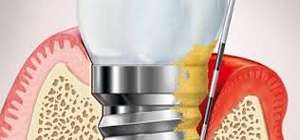 An infection around the implant not only inhibits its bonding with the jawbone, but also causes further bone loss.
If the implant becomes loose it will have to be removed. Possible causes of infection are:
An infection around the implant not only inhibits its bonding with the jawbone, but also causes further bone loss.
If the implant becomes loose it will have to be removed. Possible causes of infection are:
- poor sterilization during surgery
- poor material quality or improper placement
- poor oral hygiene
Read more about the symptoms, causes and treatment of dental implant infections
#4 Dental Implant Fracture
The advances in implant technology in the recent years have decreased the incidents of mechanical failures that could cause breaking of the implant. Although such fractures are rare, they can't be totally avoided as the material is subjected to constant pressure over a long period of time.
An implant fracture is a complication that could happen due to:
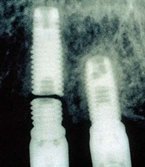
- Overloading - Usually happens when, for cost saving purposes, less implants than required are used to support a bridge or overdenture. This puts the post's material under excessive pressure it may not withstand and break.
- Uneven loading - Improper placement of implant or restoration may also put the material under abnormal pressure during chewing and cause a fracture.
- Poor material quality - Low cost implants are expected to have increased rate of failure due to fractures as they are made from cheaper materials with lower quality standards.
- Bruxism - Teeth grinding or clenching (bruxism) is another common cause of fractures. Patients with history of bruxism should use protective mouth guards during sleep.
Fractures of the implant's fixture (screw) are catastrophic failures, so it has to be removed (if possible) and replaced. If only the abutment part (the post that supports the restoration) breaks, the abutment and the crown would need replacement but the fixture can sometimes be salvaged.
Patients with High Risk of Dental Implant Complications
Several groups of patients have a higher risk of experiencing dental implant complications:
- Patients with severe jawbone loss or low bone density
- Heavy smokers, drug or alcohol abusers
- Patients with chronic diseases like diabetes, hemophilia, or immune system deficiencies
- Patients who have a chronic bruxism problem
The implant dentist must be aware of these issues before the procedure so that the treatment plan is adjusted accordingly.
next page -> Dental Implant Infection • Signs, Causes & Treatment of Peri-Implantitis



